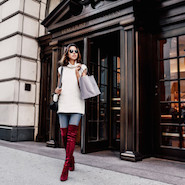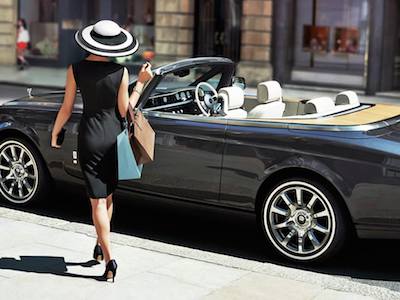 Photo of VivaLuxury courtesy of Bergdorf Goodman
Photo of VivaLuxury courtesy of Bergdorf Goodman
According to a new report by The Future Laboratory, in-store interactions remain a driving force in luxury goods purchasing with 46 percent of consumers preferring the one-on-one attention provided in a store setting.
The Future Laboratory’s “Luxury Index” examines how affluent consumers hear about and purchase luxury goods and services, with insights offering an understanding of attitudes, emotions and the mindset of the “Luxurian” demographic. By being aware of motivators, luxury brands will be able to better leverage insights to meet the demands and expectations of affluent consumers in-store and in the digital space.
“This is reflected in shopping habits, where bricks and mortar still dominates at 46 percent, whilst online (desktop/ laptop) comes in at 39 percent,” said Chris Sanderson, co-founder of The Future Laboratory. “Add mobile to this however (9 percent) and you have a digital offer that matches and even slightly surpasses physical.
“Bricks-and-mortar is just as important as it’s ever been, but brands need to focus on what makes this physical experience exceptional, and innovate in the format,” he said. “In terms of how information about luxury spreads, again we found a very human focus here – 23 percent said friends and family drives this, with 11 percent also citing social media. This compares to a mere 6 percent for online magazines.”
For its Luxury Index 2015, The Future Laboratory surveyed more than 2,000 Luxurians from the United Kingdom and the United States. The returned data provides a glimpse into the attitudes, emotions and mindset of the growing Luxurian demographic.
The Future Laboratory is a “futures consultancy agency” that advises brands on important trends that are shaping the world and how to “future-proof” their strategies.
Indexing behavior
Through its conversations with Luxurian consumers, The Future Laboratory discovered that the demographic relies heavily on the recommendations of friends and family. Many respondents shared that they ask for information and opinions of their peers before purchasing a luxury good or service.
Overall, 23 percent of respondents refer to peers when contemplating a purchase, showing that word of mouth remains powerful in the luxury goods sector. When examining the respondents by country, the Luxury Index found that this trend is higher among Luxurians from the U.S. at 26 percent, while their counterparts in the U.K. only refer to peers 19 percent of the time.
While word of mouth helps when considering a purchase, 46 percent of Luxury Index respondents prefer to shop in-store rather than through another channel such as mobile or online. Given the nature of luxury goods, Luxurians may appreciate the white-glove experience an in-store interaction affords.
 Image courtesy of Rolls-Royce Motor Cars
This may also show that Luxurians feel that the essence of luxury is lost when translated to the online space because of the high-caliber service received within a high-end brand’s boutique. In regard to products, the in-store experience is likely preferred due to bespoke capabilities and the prestige nature of luxury goods.
For Luxurians in the UK, online commerce via desktop or laptop is said to be preferred method of shopping for luxury, with 45 percent of respondents agreeing. In the U.S., online as a channel is shown as much lower with 33 percent, but 54 percent of these consumers prefer in-store.
Luxury word games
A social connection, whether through peer recommendations, suggestions made by online tastemakers or advice dispelled over social networking, seems to be a key motivator for luxury consumers.
The Ritz-Carlton Hotel Company, for example, leads online conversation among hospitality brands in the United States, according to a report by Engagement Labs.
While word of mouth is still important among high-end goods and services, online conversation, hashed out on social media platforms such as Facebook and Twitter, is steadily becoming a strategy for brands aiming for consumer retention. In Engagement Labs’ first “Total Social” ranking, Ritz-Carlton ranked the highest on social media, but fell when it came to recommendations made by offline word of mouth, presenting an opportunity for the hospitality brand (see story).
This is also true of the automotive industry. The top 15 percent of influencers generate 59 percent of word of mouth leads for automotive brands, according to a 2014 report by Foresight Research.
The report also found that luxury consumers are more likely to influence and be influenced by word of mouth than buyers in other categories. As brands find more innovative ways to leverage consumer voices, the impact of word of mouth will only grow (see story).
"Our Luxury Index for 2015 showed a seismic shift in the luxury consumer," said Mr. Sanderson. "Instead of focusing on acquisition and value, consumers are more concerned with emotion and experience.
"Whereas 27 percent of the Luxurians profiled cited ‘human connection’ as the most important factor in luxury, only 10 percent felt that ‘wealth' was the focus, and a mere 2 percent found ‘status' to be their driver," he said. "The conclusion is clearly that luxury is now dominated by social connection, and a more intangible idea of what constitutes a luxury good or service."
Final Take
Jen King, lead reporter on Luxury Daily, New York
Image courtesy of Rolls-Royce Motor Cars
This may also show that Luxurians feel that the essence of luxury is lost when translated to the online space because of the high-caliber service received within a high-end brand’s boutique. In regard to products, the in-store experience is likely preferred due to bespoke capabilities and the prestige nature of luxury goods.
For Luxurians in the UK, online commerce via desktop or laptop is said to be preferred method of shopping for luxury, with 45 percent of respondents agreeing. In the U.S., online as a channel is shown as much lower with 33 percent, but 54 percent of these consumers prefer in-store.
Luxury word games
A social connection, whether through peer recommendations, suggestions made by online tastemakers or advice dispelled over social networking, seems to be a key motivator for luxury consumers.
The Ritz-Carlton Hotel Company, for example, leads online conversation among hospitality brands in the United States, according to a report by Engagement Labs.
While word of mouth is still important among high-end goods and services, online conversation, hashed out on social media platforms such as Facebook and Twitter, is steadily becoming a strategy for brands aiming for consumer retention. In Engagement Labs’ first “Total Social” ranking, Ritz-Carlton ranked the highest on social media, but fell when it came to recommendations made by offline word of mouth, presenting an opportunity for the hospitality brand (see story).
This is also true of the automotive industry. The top 15 percent of influencers generate 59 percent of word of mouth leads for automotive brands, according to a 2014 report by Foresight Research.
The report also found that luxury consumers are more likely to influence and be influenced by word of mouth than buyers in other categories. As brands find more innovative ways to leverage consumer voices, the impact of word of mouth will only grow (see story).
"Our Luxury Index for 2015 showed a seismic shift in the luxury consumer," said Mr. Sanderson. "Instead of focusing on acquisition and value, consumers are more concerned with emotion and experience.
"Whereas 27 percent of the Luxurians profiled cited ‘human connection’ as the most important factor in luxury, only 10 percent felt that ‘wealth' was the focus, and a mere 2 percent found ‘status' to be their driver," he said. "The conclusion is clearly that luxury is now dominated by social connection, and a more intangible idea of what constitutes a luxury good or service."
Final Take
Jen King, lead reporter on Luxury Daily, New York
